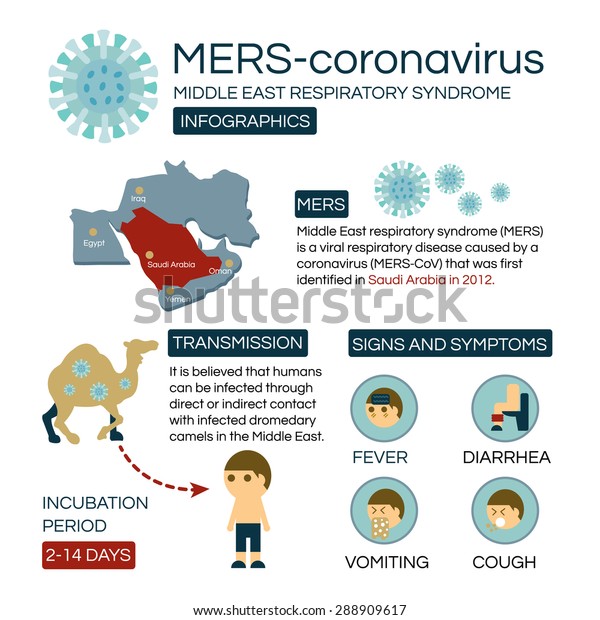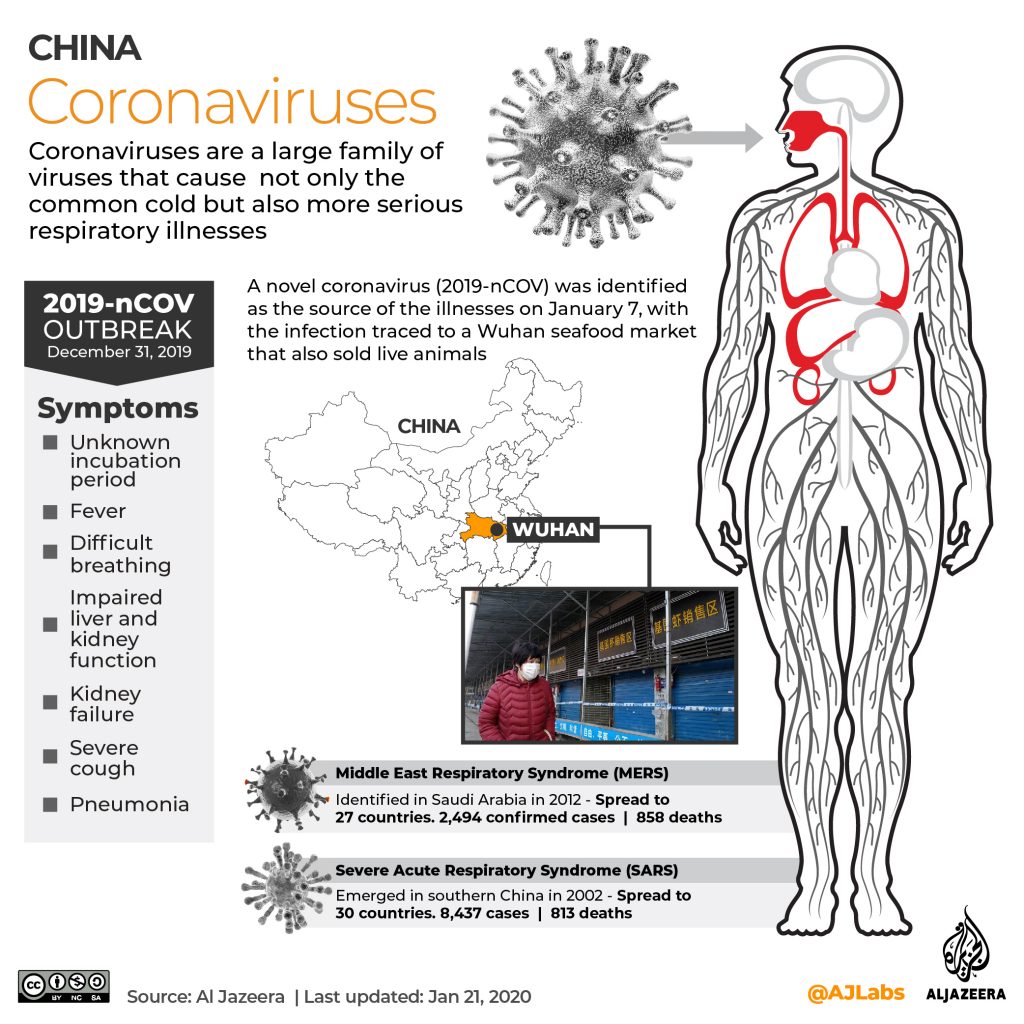
What is coronavirus?
The coronavirus is a family of viruses that can cause a range of illnesses in humans including common cold and more severe forms like SARS and MERS which are life-threatening. The virus is named after its shape which takes the form of a crown with protrusions around it and hence is known as coronavirus.
How did the recent outbreak occur?
The recent outbreak of coronavirus is believed to have occurred in a market for illegal wildlife in the central Chinese city of Wuhan. Chinese health authorities and the WHO are investigating the outbreak of the recent coronavirus which has claimed 17 lives and reportedly infected hundreds.

Is the recent strain fatal?
Since it’s a new strain, there is no specific vaccine that can treat it. However, according to the WHO, “many of the symptoms can be treated & therefore treatment based on the patient’s clinical condition”. However, it has already killed over 3000 globally.
What steps have been taken so far to check its spread?
The Chinese govt initially locked down Wuhan – the epicenter of the virus outbreak. However it was too late. The virus has spread to all continents now, except Antarctica.
How is India responding to the outbreak?
India has expanded screening of international travellers. Few Indian travellers who were found with the coronavirus strain have been isolated and treated before their release.
How has it affected the economy?
Worries are mounting that prolonged quarantines, supply chain disruptions and a sharp reduction in tourism and business travel could weaken the global economy or even cause a recession.
Points to be remembered
Coronavirus disease (COVID-19) is a new strain that was discovered in 2019 and has not been previously identified in humans.
Coronaviruses are zoonotic, meaning they are transmitted between animals and people. Detailed investigations found that SARS-CoV was transmitted from civet cats to humans and MERS-CoV from dromedary camels to humans. Several known coronaviruses are circulating in animals that have not yet infected humans.
Common signs of infection include respiratory symptoms, fever, cough, shortness of breath and breathing difficulties. In more severe cases, infection can cause pneumonia, severe acute respiratory syndrome, kidney failure and even death.

Standard recommendations to prevent infection spread include regular hand washing, covering mouth and nose when coughing and sneezing, thoroughly cooking meat and eggs. Avoid close contact with anyone showing symptoms of respiratory illness such as coughing and sneezing.
SOME FACTS IN DETAIL
What is SARS-CoV-2? What is COVID-19?
Severe Acute Respiratory Syndrome Coronavirus-2 (SARS-CoV-2) is the name given to the 2019 novel coronavirus. COVID-19 is the name given to the disease associated with the virus. SARS-CoV-2 is a new strain of coronavirus that has not been previously identified in humans.
- Where do coronaviruses come from?
Coronaviruses are viruses that circulate among animals with some of them also known to infect humans.
Bats are considered as natural hosts of these viruses yet several other species of animals are also known to be a source. For instance, the Middle East Respiratory Syndrome Coronavirus (MERS-CoV) is transmitted to humans from camels, and the Severe Acute Respiratory Syndrome Coronavirus-1 (SARS-CoV-1) is transmitted to humans from civet cats. More information on coronaviruses can be found on the ECDC factsheet.
- Is this virus comparable to SARS or to the seasonal flu?
The novel coronavirus detected in China is genetically closely related to the SARS-CoV-1 virus. SARS emerged at the end of 2002 in China, and it caused more than 8 000 cases in 33 countries over a period of eight months. Around one in ten of the people who developed SARS died.
The current COVID-19 outbreak caused around 7 000 reported cases in China during the first month after initial reports (January 2020), with a further 80 000 cases reported globally during the second month (February 2020). Of these first 87 000 cases, about 3 000 died. Cases are now being detected in Europe and across the globe. See the situation updates for the latest available information.
While the viruses that cause both COVID-19 and seasonal influenza are transmitted from person-to-person and may cause similar symptoms, the two viruses are very different and do not behave in the same way. ECDC estimates that between 15 000 and 75 000 people die prematurely due to causes associated with seasonal influenza each year in the EU, the UK, Norway, Iceland and Liechtenstein. This is approximately 1 in every 1 000 people who are infected. By comparison, the current estimated mortality rate for COVID-19 is 20-30 per 1 000 people.
Despite the relatively low mortality rate for seasonal influenza, many people die from the disease due to the large number of people who contract it each year. The concern about COVID-19 is that, unlike influenza, there is no vaccine and no specific treatment for the disease. It also appears to be as transmissible as influenza if not more so. As it is a new virus, nobody has prior immunity which in theory means that the entire human population is potentially susceptible to COVID-19 infection.
Are children also at risk of infection?
Disease in children appears to be relatively rare and mild. A large study from China suggested that just over 2% of cases were under 18 years of age. Of these, fewer than 3% developed severe or critical disease.
- What about pregnant women?
There is limited scientific evidence on the severity of illness in pregnant women after COVID-19 infection. That said, current evidence suggests that severity of illness among pregnant women after COVID-19 infection is similar to that in non-pregnant adult COVID-19 cases, and there is no data that suggests infection with COVID-19 during pregnancy has a negative effect on the foetus. At present, there is no evidence of transmission of COVID-19 from mother to baby occurring during pregnancy. ECDC will continue to monitor the emerging scientific literature on this question, and suggests that all pregnant women follow the same precautions for the prevention of COVID-19, including regular handwashing, avoiding individuals who are sick, and self-isolating in case of any symptoms, while consulting a healthcare provider by telephone for advice.
- Is there a treatment for the COVID-19 disease?
There is no specific treatment for this disease, so healthcare providers treat the clinical symptoms (e.g. fever, difficulty breathing) of patients. Supportive care (e.g. fluid management, oxygen therapy etc.) can be highly effective for patients with symptoms.
- When should one be tested for COVID-19?
Current advice for testing depends on the stage of the outbreak in the country or area where you live. Countries across the EU/EEA might be in different scenarios, even within the same country, and testing approaches will be adapted to the situation at national and local level.
National authorities may decide to only test subgroups of suspected cases based on the national capacity to test, the availability of necessary equipment for testing, the level of community transmission of COVID-19, or any other criteria. As a rational approach, national authorities may consider prioritising testing in the following groups:
- hospitalised patients with severe respiratory infections;
- cases with acute respiratory infections in hospital or long-term care facilities;
- patients with acute respiratory infections or influenza-like illness in certain outpatient clinics or hospitals in order to assess the extent of virus circulation in the population;
- elderly people with underlying chronic medical conditions such as lung disease, cancer, heart failure, cerebrovascular disease, renal disease, liver disease, diabetes, and immunocompromising conditions
For more such notes, Articles, News & Views Join our Telegram Channel.
Click the link below to see the details about the UPSC –Civils courses offered by Triumph IAS. https://triumphias.com/pages-all-courses.php


